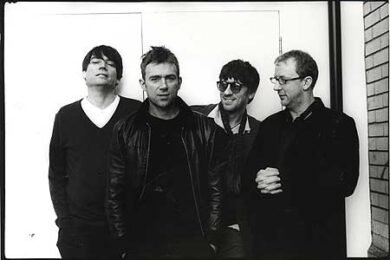Tickets went on sale this morning for the must-see event of next summer. It might have been the worst kept secret in pop since those rumours that George Michael was, you know, Greek, but Blur – flanked by adverts depicting a greyhound from their classic album Parklife – announced this week that they are to reform for two huge open air gigs in Hyde Park, a tour and in all probability, Glasto. "It feels like we’re kids again" Damon Albarn told the NME. Since Tuesday, blogs and message boards have been twinkling in perpetual delight at the prospect. "Basically, this is as close as we’ll get to the Beatles getting back together", said one fan, before plunging his head deep into his keyboard for a long satisfying sob.
In fact it seems someone infected the pop reservoirs with industrial sized amounts of Christmas cheer this week. You could hardly catch your breath as long standing feuds melted like butter under a blowtorch. Aside from the cockle-warming image of Coxon and Albarn reunited, Robbie Williams, fresh from trying to locate underwater extra-terrestrials in Malibu, ran back to Take That’s comforting embrace. Then, fuelled by a report in The Mirror, rumours spread that Stephen ‘I’d rather eat a rare rib of beef than reform The Smiths’ Morrisey might be warming to the idea of dusting off the gladioli and joining Johnny ‘It’s no biggy’ Marr onstage again. The Specials and Cliff Richards and the Shadows are playing major tours next year too.
Police and Led Zeppelin last year. Leonard Cohen and Queen this. As the one-in-one-out queues grow outside doomed Woolworths stores it feels as if the artists languishing in the bargain bins have come alive, reanimating in arenas and stadiums across the land for big pay. Recently, though, the ultimate comeback has been discussed: Michael Jackson. A piece in the Independent last Sunday discussed the possibility of a return. "He’s in terrible shape, of course, and has actually got a little bit fat in the last year" said a source close to an interested promoter, before explain why a little thing like not being able to perform shouldn’t get in the way of performance itself. "He wouldn’t even need to be able to still sing. There’s so much you can do with technology these days. In fact, you’d be surprised how many of the top selling live acts who have been around for years aren’t actually able to sing any more. And people would certainly pay to see it."
Here lies the crux. People would pay to see Michael Jackson on stage again, even if the moonwalk was reduced to a hunched over wheelchair-bound spasm, or his trademark falsetto ‘Eee-hee’ provided by a pre-recorded synthetic blast, fans would sell their grandmother to a glue factory to bag themselves the chance to be there. And if it goes ahead they might have to resort to such measures; the price for a ticket has been mooted at $1000, obviously adding a few noughts for their inevitable destination on eBay.
The likely locale for a Jackson gig would be Vegas, and it figures. Yet at the beginning of the year, it seemed possible that he would be appearing at the O2 Arena. Recently I talked to the poet and author Iain Sinclair – a fierce critic of the Dome and subsequently the O2 – for a book I am writing on music venues. "The big idea of new Labour was to create these vast casinos and turn the whole thing into a kind of Las Vegas", he said. "That didn’t work, so as second best they’ve ended up with Las Vegas type shows being shown on a bit of toxic dockland. It’s completely weird and cryogenic. Digging up ancient rock acts and Tutenkhamun."
The O2 is Britain’s stab at Vegas, the surrounding grey industrial Estates and car parks of Greenwich our Nevada. Yet, the big, off-white tent itself is a mere symbol for the cabaret-plague that the whole of the UK has been seized by. American promoters such as Live Nation (who dangled the carrot for Blur to return) and AEG (who own the O2 itself, as well as scores of similar venues such as O2 Berlin, and who were the promoters behind Leonard Cohen’s recent world tour) have transformed the landscape. It seems logical; while record sales have plummeted, the industry is increasingly reliant on the big names, and the biggest money is in persuading those who nobody ever thought they would see again to get back on the road. And it does feel mean to begrudge a performer like Cohen the chance to recoup some cash after being swindled out of it by his former manager.
Yet such gigs infantilise the audience. I was in Camden last year on the same night as the Verve played their comeback gig at the Roundhouse. The area was filled with ageing Wellers and Liams in denim jackets, swaggering into one another as if taking part in some kind of Britpop battle recreation. Like those 14-year-old kids who are still breastfed by their mothers that you see on documentaries, they find it harder and harder to let go of their favourite band, let their musical taste evolve, regenerate. Why else would Shed Seven have enjoyed their biggest tour of all time just last year?
Big performances are about more than a gratifying sing-along. In fact, the best balance out the pleasing fixity of classic songs with virgin material, which has the potential to stun. Blur still have such potential – Damon isn’t Cliff Richard yet – but will anybody want them to veer to far from nostalgia? What is certain is this: When Phil Daniels bounds out onto that Hyde Park stage there will be bug-eyed pandemonium.



